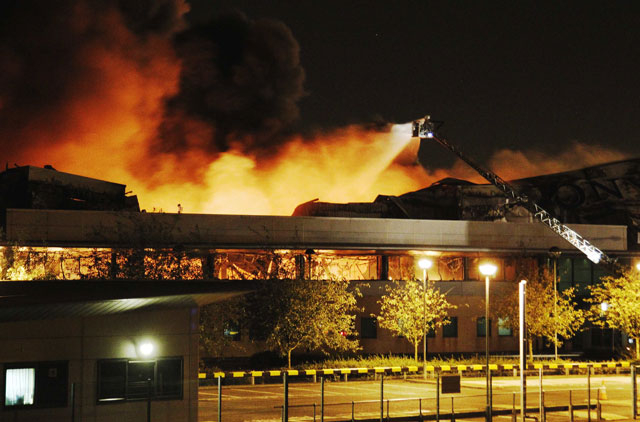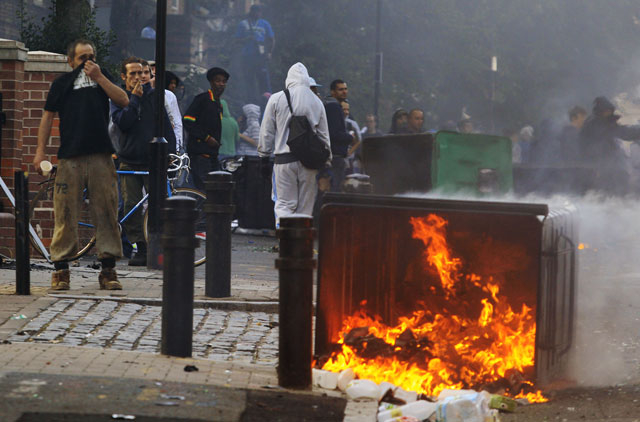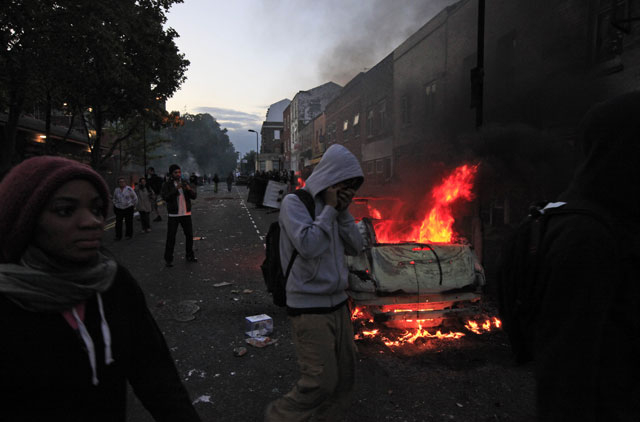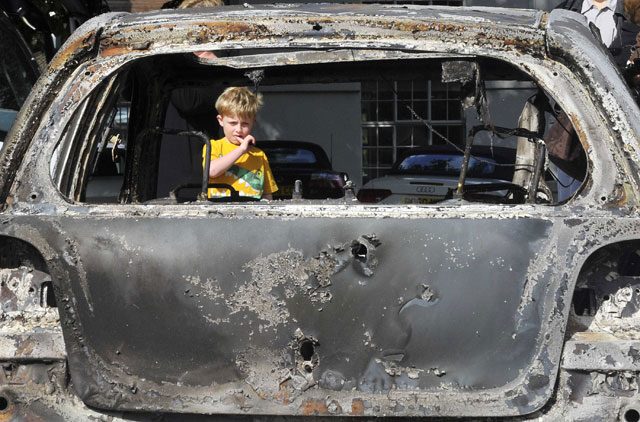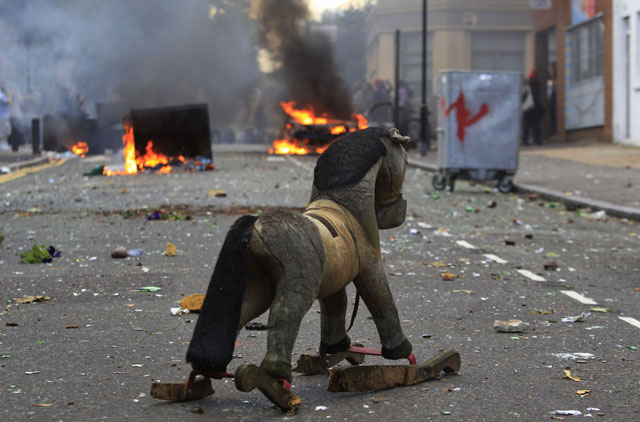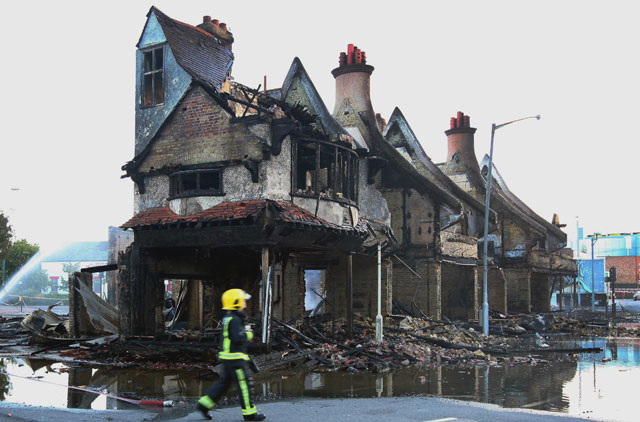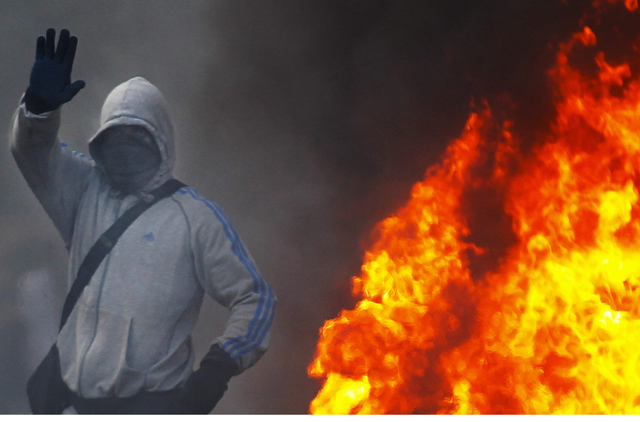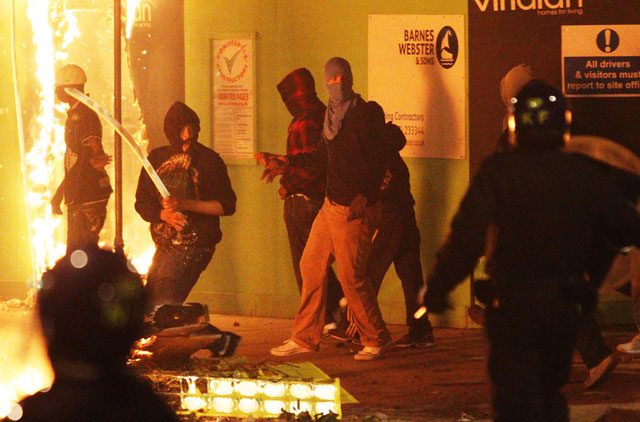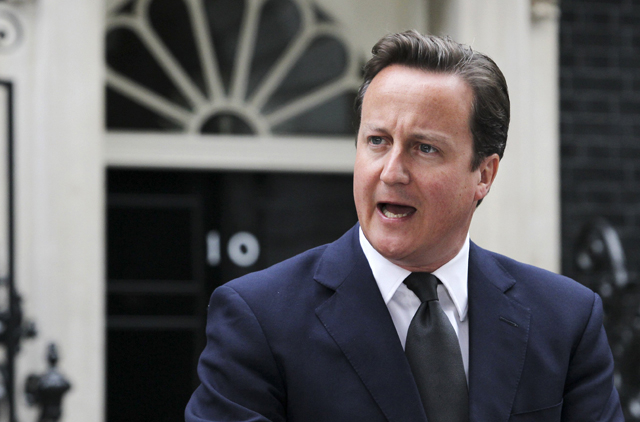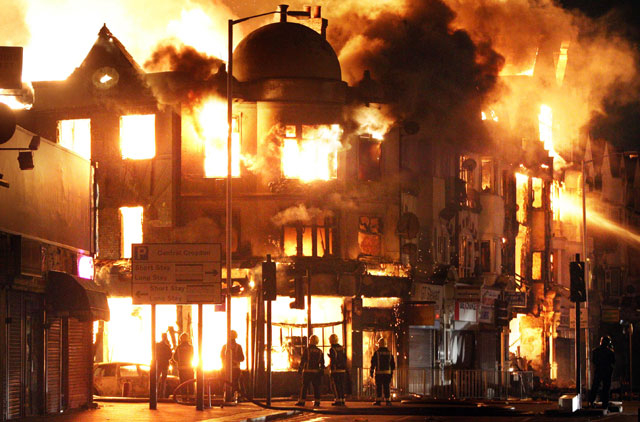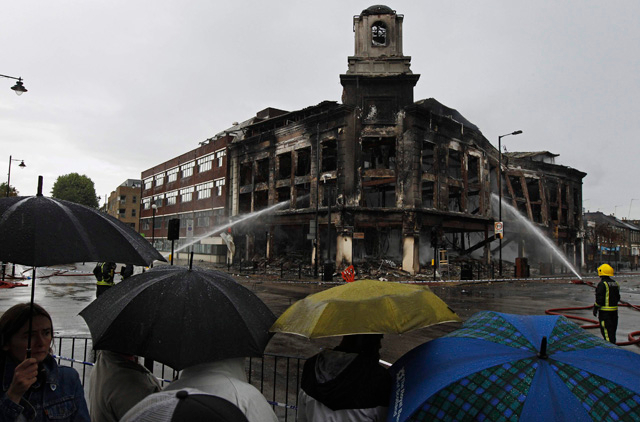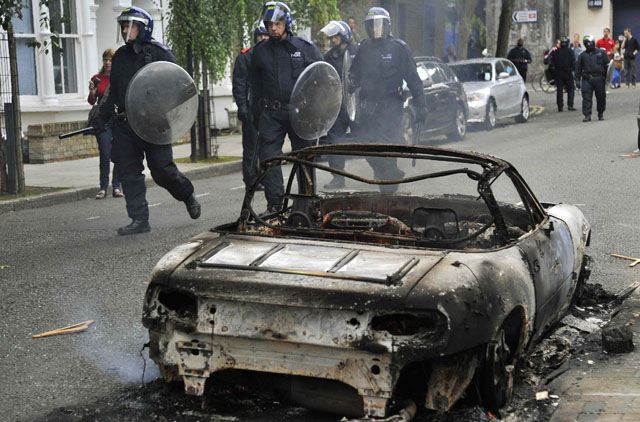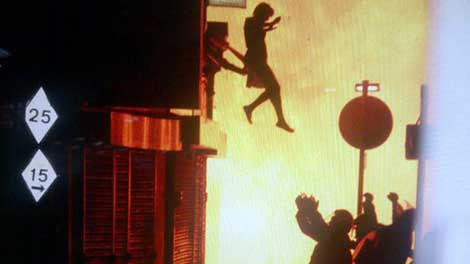
First fatality claimed
London: A man who was shot in a car during riots in London died in hospital Tuesday from his injuries, police said, becoming the first fatality from three days of unrest in the British capital.
In pictures: London riots, day 3
The 26-year-old man was found with a gunshot wound to his head late Monday in Croydon, a south London suburb where several buildings were burned down during the riots, London's Metropolitan Police said.
Click here to see the locations of riots (pdf)
Police said he had travelled to Croydon with some friends, and they got into a row with another group of people, which ended in a car chase involving three vehicles.
Two men were arrested at the scene on suspicion of handling stolen goods.
Police from Operation Trident, which specialises in gun crime within the black community, have now launched a murder investigation.
138 arrested in Birmingham
Birmingham: British police said Tuesday they had arrested 138 people in Birmingham after a night of rioting as violence spread from London to elsewhere in the country.
At least 30 shops and other premises were attacked in Birmingham, Britain's second biggest city with around one million residents, overnight Monday.
Up to 800 masked rioters smashed and looted shops in the city's main shopping centre and a police station was also set on fire in an inner city area, West Midlands police said.
About 400 police in riot gear were deployed to deal with the disturbances, with more officers supporting them.
"Last night was a really terrible night for the country and a very bad night for Birmingham," said Chief Constable Chris Sims, head of West Midlands police.
Greedy
"And let me say this; this was not an angry crowd, this was a greedy crowd. What we were dealing with was dishonesty and disorder."
He added many of those arrested were "astonishingly young".
"They are teenagers, girls and boys, and I would appeal to their parents and to the wider community to make sure that they don't go off tonight on to the streets but stay indoors where they are safe."
Pariament to be recalled
British Prime Minister David Cameron said he would recall Parliament from its summer recess for a day on Thursday after rioting swept through London for three consecutive nights.
"This is criminality pure and simple," he told reporters on Tuesday outside his Downing Street office after breaking off his annual holiday to return to Britain.
"People should be in no doubt that we will do everything necessary to restore order to Britain's streets."
As residents and shopkeepers surveyed smashed windows, looted shops and burned out buildings in several areas of the capital, many called for police to take more forceful action.
16,000 police to be on duty on Tuesday night
Cameron said some 16,000 police would be on London's streets on Tuesday night, up from the 6,000 on duty on Monday, boosted by reinforcements from across the country.
"It is quite clear that we need more, much more, police on our streets and we need even more robust police action," he said.
"These are sickening scenes ... this is criminality, pure and simple, and it has to be confronted and defeated."
He said parliament would meet on Thursday "so I can make a statement to parliament and we can hold a debate and we are all able to stand together in condemnation of these crimes".
To restore order
The British government earlier sid it would do "everything necessary" to restore order after the country's worst riots for decades, Prime Minister David Cameron said on Tuesday after returning early from holiday to deal with the chaos.
"People should be in no doubt that we will do eveything necessary to restore order to the streets and to make them safe for the law abiding," Cameron said, condemning the "sickening scenes" caused by the riots.
Riots spread through UK cities
A wave of violence and looting raged across London and spread to three other major British cities Tuesday, as authorities struggled to contain the country's worst unrest since race riots set the capital ablaze in the 1980s.
In London, groups of young people rampaged for a third straight night, setting buildings, vehicles and garbage dumps alight, looting stores and pelting police officers with bottles and fireworks. The spreading disorder was an unwelcome warning of the possibility of violence during London's 2012 Summer Olympics, less than a year away.
Police called in hundreds of reinforcements and volunteer police officers, and made a rare decision to deploy armoured vehicles in some of the worst-hit districts, but still struggled to keep pace with the chaos unfolding at flashpoints across London, in the central city of Birmingham, the western city of Bristol and the northwestern city of Liverpool.
"The violence we have seen is simply inexcusable. Ordinary people have had their lives turned upside down by this mindless thuggery," police commander Christine Jones said.
Little unifying cause
London's police said 14 people were injured, including a man in his 60s with life threatening injuries.
The riots appeared to have little unifying cause, though some involved claimed to oppose sharp government spending cuts, which will slash welfare payments and cut tens of thousands of public sector jobs through 2015.
The International Olympic Committee insisted it had confidence in British authorities. "Security at the Olympic Games is a top priority for the IOC," spokesman Mark Adams said.
"Come join the fun!"
But many appeared attracted simply by the opportunity for violence. "Come join the fun!" shouted one youth in the east London suburb of Hackney, where shops were attacked and cars torched.
Test of David Cameron's government
The crisis will be a major test of Prime Minister David Cameron's Conservative-led coalition government, which includes Liberal Democrats who had long suspected its program of harsh budget restraints could provoke popular dissent. Cameron cut short his summer vacation in Italy, rushing home for a crisis meeting Tuesday.
Cameron was expected to toughen the police response. Britain's Home Secretary Theresa May refused to outline what that might entail, but seemed to rule out more drastic measures.
"The way we police in Britain is not through use of water cannon," she told Sky News. "The way we police in Britain is through consent of communities."
Rioters were left virtually unchallenged in several neighbourhoods and able to plunder from stores at will or attempt to invade homes. Restaurants and stores fearful of looting closed early across London.
Flames, rioting engulf London for third day
Violence escalated across London and at least three other cities on Tuesday as police fought thousands of rioters and looters and Prime Minister David Cameron headed back to Britain to face the crisis.
In unprecedented scenes of rioting in the capital, buildings were in flames in Croydon, Peckham and Lewisham in the city's south, while gangs of looters roamed the streets of Hackney in the east, Clapham in the south, Camden in the north and Ealing in the west.
334 arrests over the three days
Police said Tuesday they had made 334 arrests over the three days, including an 11-year-old boy. At least 35 police officers were injured in the unrest at the weekend. Sixty-nine people were charged.
Scotland Yard said it had deployed an extra 1,700 officers to deal with the London unrest, the worst in years. Armoured cars were used to quell the rioters.
Police pour into Hackney
Hundreds of riot police poured into Hackney to try to contain the violence in a district just a few miles (kilometres) from where the 2012 Olympics will take place in a year's time.
As darkness fell, police wielding batons pushed the youths back, while local residents hoping to return to their homes were kept behind police cordons.
In Croydon, an entire block of buildings - including a 100-year-old family furniture business - was ablaze, sending flames leaping into the night sky.
Local residents were evacuated due to the spreading fire, while the Guardian newspaper quoted a nearby officer as admitting: "We can't cope. We have passed breaking point."
Just outside Croydon town centre, hordes of looters roamed the streets unchallenged while the smell of burning cars and buildings hung in the air, an AFP correspondent said.
Firefighters also battled a severe blaze in Clapham after looters rifled their way through the renowned Debenhams department store. Wealthy neighbourhoods were not spared with rampagers forcing their way into Michelin-starred restaurant The Ledbury in Notting Hill before stealing diners' phones, plates off the tables and attempting to take the till.
The violence first erupted on Saturday in the multi-ethnic neighbourhood of Tottenham in north London after a man was shot dead by police two days earlier.
Copycat violence then spread to other areas of the British capital on Sunday before reaching to new districts on Monday.
Rioting also broke out in the English cities of Liverpool, Birmingham and Bristol.
Cameron to chair meeting of Britain's emergency response committee
Prime Minister Cameron, who had resisted calls to cut short his family holiday in Italy amid last week's turmoil on the financial markets, was due to return to Britain Tuesday, his Downing Street office said. He will chair a meeting of Britain's emergency response committee and hold separate talks with the Home Secretary Theresa May and the acting London police chief.


